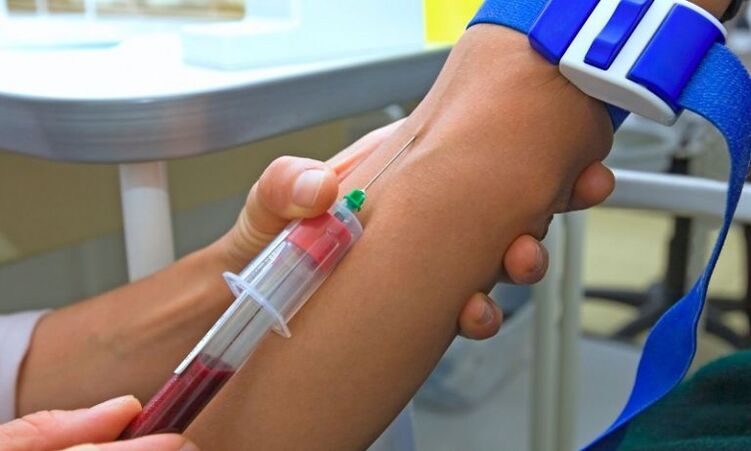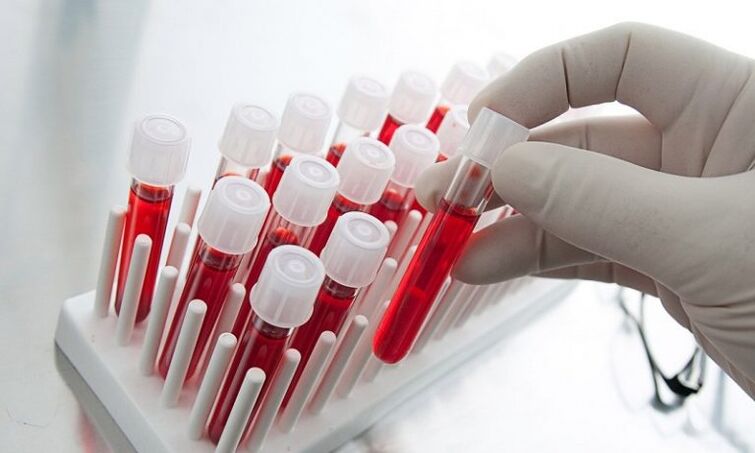Diagnosis of inflammation of the prostate gland at the moment is a very simple procedure for a doctor. Aside from the rare atypical forms of the disease, it is relatively easy to diagnose acute prostatitis.

During the treatment of the disease, the patient needs to undergo a series of laboratory and instrumental examinations. Often patients are interested in why they need to take a general PSA blood test for prostatitis. Not everyone understands the role of this marker in diagnosing the underlying disease.
What is PSA?
Prostate specific antigen (PSA) is a special glycoprotein that is produced exclusively by the cells of the prostate gland. Its main role is sperm liquefaction and sperm activation during ejaculate formation.
This protein can be found in the blood, and since it is produced only in the prostate, it partially demonstrates its function and all kinds of lesions.
It is widely used in the diagnosis of diseases such as:
- Chronic prostatitis;
- Benign prostatic hyperplasia - prostate adenoma;
- Malignant neoplasms of the male organ - prostate cancer.
A general PSA blood test in chronic prostatitis can show the progress of the disease and a dangerous complication of the disease, which is manifested by the degeneration of damaged cells into atypical ones with the formation of prostate cancer.
Prostate specific antigen is a tumor marker that can indicate the presence of a tumor at an early stage of its development.
Normal indicators
Since the protein is synthesized in the tissues of the male gland, the presence of a small volume of it in the blood is the norm. The screening threshold for normal activity of a tumor marker is a value up to 4 ng / ml in blood.

The amount of protein directly depends on the following factors:
- The age of the man. There is a certain correlation between how old the patient is and the activity of the production of a marker by the gland;
| Age, years | PSA index, ng / ml |
| 40-49 | 2. 5 |
| 50-59 | 3. 5 |
| 60-69 | 4. 5 |
| > 70 | 6. 5 |
- The regularity of sexual intercourse;
- The presence of an inflammatory process in the prostate;
- Physical trauma and organ damage;
- Postponed surgical interventions or specific diagnostic procedures (prostate massage, digital rectal examination);
- Taking medications.
All of these aspects can affect the antigen count in the bloodstream, and sometimes even confuse doctors. That is why it is necessary to know how to correctly pass a PSA blood test for general male prostatitis, so that further therapy is successful.
PSA preparation
Before a man donates blood for the detection of prostate specific antigen, he must observe some important points that prevent misinterpretation of the final result.

To avoid laboratory errors, the patient should take into account the following features:
- You must not eat 8 hours before blood sampling. You can drink tea, juice, or water.
- Avoid cycling, stationary cycling, or long-distance hiking (> 5 km) 24 hours before the start of the study.
- 1 week before the test, you need to refrain from sexual intercourse and masturbation, taking spicy and smoked food.
- If the patient underwent transrectal ultrasound of the prostate (TRUS), digital examination of the rectum, colonoscopy or bladder catheterization, it is necessary to wait at least 7 days before determining PSA in the blood.
- After a prostate biopsy or prostate massage, you need to wait 2 weeks.
Only if all these rules are observed will it be possible to say that the PSA blood test for general prostatitis will be really reliable.
Interpretation and purpose of the PSA tests
The main purpose of such an examination is the ability to control the course of the chronic form of the disease and quickly identify the problem if malignancy (tumor formation) of the prostate occurs.
In diseases such as acute, chronic, bacterial, congestive prostatitis, the PSA level may rise slightly to 5 ng / ml. This is not yet a cause for panic. If, after carrying out adequate drug therapy, the indicator does not normalize, then this is considered an absolute indication for an organ puncture with its subsequent histological examination.
Normally, the larger the volume of the prostate, the more cells are capable of producing glycoprotein. It has been clinically proven that 1 gram of organ parenchyma in benign hyperplasia additionally synthesizes 0. 35 ng / ml of antigen. The same indicator for cancer is 3. 5 ng / ml.
This ratio allows doctors to judge with a high degree of certainty about the possibility of developing malignant neoplasms in chronic inflammation of the prostate gland. According to statistics, 83% of patients with cancer simultaneously suffered from prolonged inflammation in the male gland. This allows us to consider this pathology as a predictor of cancer.
Conclusion
A blood test for PSA in prostatitis is part of the mandatory examinations of urological patients. Its importance can hardly be overestimated, since it can reliably indicate the formation of atypical cell growth, which leads to the development of malignant neoplasms.























